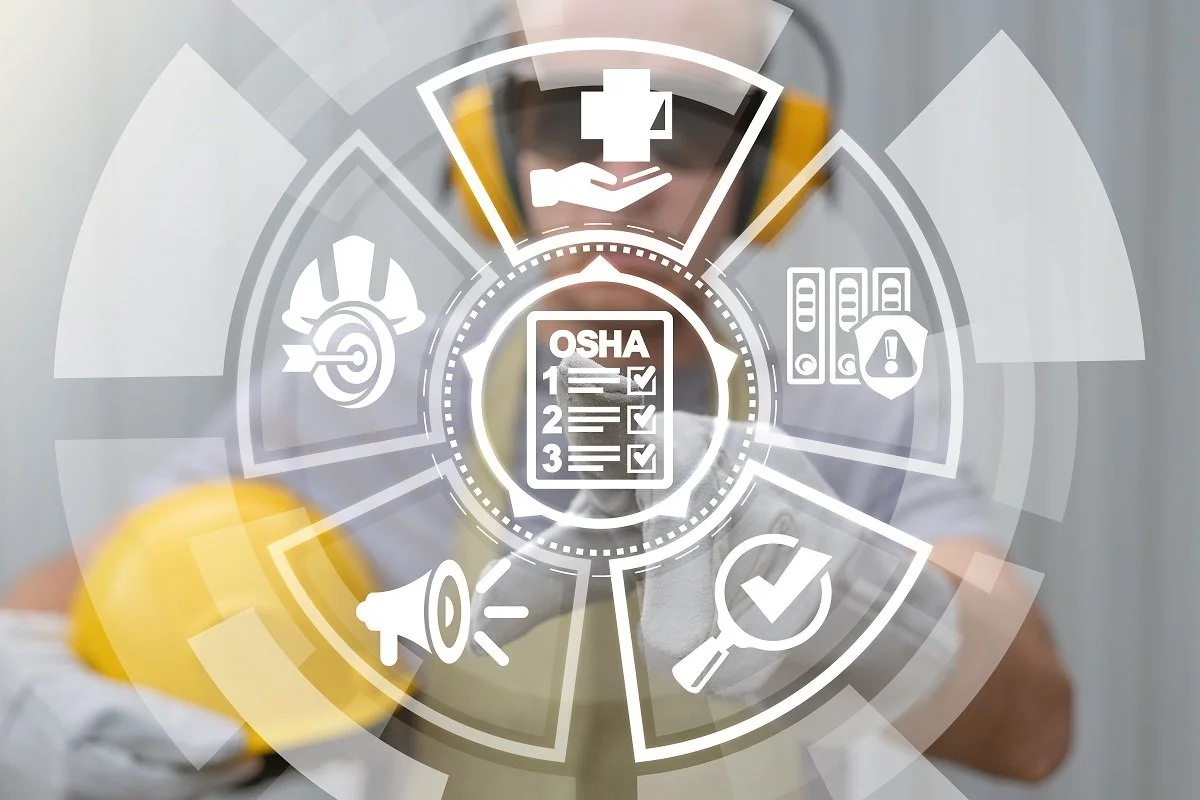
Industry News

OSHA Officially Rules for Expanded Recordkeeping Requirements for High-Hazard Industries
Author, Megan Lockhart, Client Communications Coordinator, Rancho Mesa Insurance Services, Inc.
Recently, the Occupational Safety and Health Administration (OSHA) made its final ruling to expand recordkeeping requirements for high-hazard industries, such as construction. The new requirements will take effect January 1, 2024 and will expand on what injury and illness information is needed to be electronically submitted to OSHA.
Author, Megan Lockhart, Client Communications Coordinator, Rancho Mesa Insurance Services, Inc.
Recently, the Occupational Safety and Health Administration (OSHA) made its final ruling to expand recordkeeping requirements for high-hazard industries, such as construction. The new requirements will take effect January 1, 2024 and will expand on what injury and illness information is needed to be electronically submitted to OSHA.
The requirements state that businesses with 100 or more employees in certain high-hazard industries must now electronically submit information from their Form 300-Log of Work-Related Injuries and Illnesses, as well as Form 301-Injury and Illness Incident Report to OSHA annually. This is in addition to Form 300A-Summary of Work-Related Injuries and Illnesses, which is already required.
Additionally, establishments are required to include their legal company name when making these submissions to OSHA from their injury and illness records.
Companies in high-hazard industries are already required to keep records of their work-related injuries and illnesses; however, this data is now to be submitted to OSHA, and the information gathered will be published on the OSHA website.
“OSHA will use these data to intervene through strategic outreach and enforcement to reduce worker injuries and illnesses in high-hazard industries,” Doug Parker, Assistant Secretary for Occupational Safety and Health, said in OSHA’s press release. “The safety and health community will benefit from the insights this information will provide at the industry level, while workers and employers will be able to make more informed decisions about their workplace's safety and health."
California businesses currently submit their recordkeeping information directly to Federal OSHA. Although the Cal/OSHA board has yet to release information regarding these new requirements, they must choose to uphold the standards set by Fed/OSHA or create stricter requirements. We will keep clients informed as further guidelines are announced.
OSHA Proposes to Expand Electronic Form Submission Requirements
Author, Lauren Stumpf, Media Communications & Client Services Specialist, Rancho Mesa Insurance Services, Inc.
The Occupational Safety and Health Administration (OSHA) recently released a proposed rule that would increase electronic reporting requirements for businesses summiting OSHA logs.
Author, Lauren Stumpf, Media Communications & Client Services Specialist, Rancho Mesa Insurance Services, Inc.
The Occupational Safety and Health Administration (OSHA) recently released a proposed rule that would increase electronic reporting requirements for businesses summiting OSHA logs.
Currently, establishments with 250 or more employees, regardless of classification, and establishments with 20-249 employees, classified in certain high hazard industries, must electronically submit their Form 300A Summary to OSHA, annually.
The proposed rule changes would declare that only those in the classified high-hazard industries with 100 or more employees will be required to submit their Form 300A Summary electronically to OSHA. It would also require that Forms 300 and 301 be submitted electronically by these companies, when previously these two forms were to be kept confidential and only available to OSHA upon request.
Classified high hazard establishments with 20-99 employees would still only be required to submit the 300A Summary electronically to OSHA and would not need to electronically submit the 300 and 301 forms.
Under the proposed rule, OSHA would update the industries that are classified as high hazard and need to submit the data electronically.
OSHA has also proposed that company names be included on the electronic submissions. This, along with the injury and employee information that is included on the 300 and 301 forms, raises privacy concerns because this information would be available for public view via the Freedom of Information Act (FOIA).
The comment period for the public to voice their concerns ends on May 31, 2022. Information on how to submit comments on the proposed rule can be on the Federal Register.
OSHA Issues ETS Addressing Mandatory COVID-19 Vaccination or Testing
Author, Sam Clayton, Vice President, Construction Group, Rancho Mesa Insurance Services, Inc.
Last week, the U.S. Department of Labor’s Occupational Safety and Health Administration (OSHA) announced a new emergency temporary standard (ETS) to protect more than 84 million workers from the spread of the coronavirus on the job.
Author, Sam Clayton, Vice President, Construction Group, Rancho Mesa Insurance Services, Inc.
Update: November 16, 2021 - Since the original publication of this article, OSHA announced it “has suspended activities related to the implementation and enforcement of the ETS pending future developments in the litigation.”
Recently, the U.S. Department of Labor’s Occupational Safety and Health Administration (OSHA) announced a new Emergency Temporary Standard (ETS) to protect more than 84 million workers from the spread of the coronavirus on the job.
Under the ETS standard, employers must develop, implement and enforce a mandatory COVID-19 vaccination policy, unless they adopt a policy requiring employees to be either vaccinated or undergo weekly COVID-19 testing and wear a face covering at work.
The emergency temporary standard covers employers with 100 or more employees and provides options for compliance. The standard also requires employers to provide paid time to workers to get vaccinated and to allow paid leave to recover from any side effects from the vaccination.
The ETS requires employers to:
Determine the vaccination status of employees, obtain acceptable proof of vaccination and maintain records and a roster of each employee’s vaccination status.
Require employees to provide prompt notice when they test positive for COVID-19 or receive a COVID-19 diagnosis. Employers must then remove the employee from the workplace, regardless of vaccination status. Employers must not allow them to return to work until they meet required criteria.
Ensure each worker who is not fully vaccinated is tested for COVID-19 at least weekly (if the employee is in the workplace at least once a week) or within 7 days before returning to work (if the employee is away from the workplace for a week or longer).
Ensure that each employee who has not been fully vaccinated wears a face covering when indoors or when occupying a vehicle with another person for work purposes.
The ETS does not require employers to pay for testing. However, employers may be required to pay for testing to comply with other laws, regulations, collective bargaining agreements. So, check with state and local jurisdictions for requirements.
The ETS is effective immediately upon its publication in the Federal Register, which took place on Friday, November 5, 2021. Employers must comply with most requirements within 30 days of publication and with testing requirements within 60 days of publication, or January 4th of 2022.
While more than half of the states are challenging the legality of federal OSHA’s ability to enforce the new ETS requirements, it is likely that individual states with their own OSHA State Plans (i.e., Alaska, Arizona, California, Hawaii, Indiana, Iowa, Kentucky, Maryland, Michigan, Minnesota, Nevada, New Mexico, North Carolina, Oregon, South Carolina, Tennessee, Utah, Vermont, Virginia, Washington, and Wyoming) will eventually adopt the new ETS as their own with or without modifications.
California’s State Plan (Cal/OSHA) implemented the most stringent COVID-19 ETS in the country months before federal OSHA released its original COVID-19 ETS that only applied to the health care industry.
Employers of all sizes should pay close attention to not only what federal OSHA’s ETS requires, but also requirements issued by state and local municipalities. Once your state adopts a COVID-19 ETS, be sure to also check your local ordinances, as some counties and cities are requiring additional measures.
If your state has not yet adopted the new federal OSHA ETS, which applies to our California clients, we recommend you start thinking about a game plan and maybe an alternate plan depending on whether your State Plan decides to adopt the ETS as it has been published or if they decide to adopt a more stringent ETS. You will want to consider the following:
Will you, as the employer, require all employees to be vaccinated?
Who will manage the vaccination records and the ongoing paperwork?
If testing is offered as an alternative to a vaccine, who will pay for testing (the employer or employee)?
If testing is offered as an alternative to a vaccine, will the company specify which type of test will be acceptable (PCR or Antigen)? Either is allowed, but the antigen tests must be proctored by a medical professional (virtually is allowed) or witnessed by the employer (for the over-the-counter home test). Who will administer the weekly tests?
As we learn more, Rancho Mesa will provide guidance and resources to mitigate risk in the workplace.
For questions about mitigating your risks, contact me at (619) 937-0167 or sclayton@ranchomesa.com.
ANSI Releases New Mobile Elevating Work Platforms Standards
Author, Casey Craig, Account Executive, Rancho Mesa Insurance Services, Inc.
Last year, the American National Standards Institute (ANSI) updated their aerial lift standard, starting with renaming it Mobile Elevating Work Platforms (MEWP). This has been in the works since 2018 and is designed to align training, certifications, and equipment used on a more universal standard. According to the Center for Construction Research and Training (CPWR), roughly 26 people die from MEWP each year. This prompted the Occupational Safety and Health Administration (OSHA) to increase training requirements to keep accidents to a minimum. Obviously, MEWP are essential for completing a wide variety of construction jobs. So, what should you, as a business owner, be doing to ensure your employees are safe and in compliance when OSHA comes by your jobsites?
Author, Casey Craig, Account Executive, Rancho Mesa Insurance Services, Inc.
Last year, the American National Standards Institute (ANSI) updated their aerial lift standard, starting with renaming it Mobile Elevating Work Platforms (MEWP). This has been in the works since 2018 and is designed to align training, certifications, and equipment used on a more universal standard. According to the Center for Construction Research and Training (CPWR), roughly 26 people die from MEWP each year. This prompted the Occupational Safety and Health Administration (OSHA) to increase training requirements to keep accidents to a minimum. Obviously, MEWP are essential for completing a wide variety of construction jobs. So, what should you, as a business owner, be doing to ensure your employees are safe and in compliance when OSHA comes by your jobsites?
MEWP are prone to tipping over on uneven ground and in inclement weather conditions, if equipment is extended out. The most common cause of the MEWP tipping over is driving it over uneven surfaces. Understandably, many contractors rush to complete projects but moving extended lifts can be the easiest way to have a serious accident. Alternatively, taking proper time to lower a lift before moving it leads to fewer serious accidents.
Identifying exposures and objects that conflict with a lift’s surroundings is also of great concern for lift operators. A very common occurrence involves employees being pinned between the lift and an object. It is easy to become fixated on either the ground or the direction the lift is moving and ”miss” objects that could be hazardous as you are raising and lowering the lift. Allowing for time to plan ahead and move the machinery safely is immensely important.
Many of these new requirements are focused on teaching proper equipment use and creating an awareness of the changes to new equipment in the marketplace. Inherently, these machines are dangerous but necessary. So, maintaining a respect for them and understanding how to properly use them is vital. Lift use trainings, techniques, and protocol are available through our Risk Management Center and are compliant with the new ANSI/SAIA A92.20, A92.22, and A92.24 standards that were just released, last year.
Please reach out to me at ccraig@ranchomesa.com or call at 619-937-0164 for more information, or for help assigning the trainings.
Californians Wait for Revised COVID-19 Prevention Emergency Temporary Standards
Author, Alyssa Burley, Media Communications and Client Services Manager, Rancho Mesa Insurance Services, Inc.
Over the past few weeks, Californians have eagerly awaited news from the State’s Occupational Safety and Health Standards Board (Standards Board) on revisions to Cal/OSHA’s COVID-19 Prevention Emergency Temporary Standards after the Centers for Disease Control (CDC) released its latest guidance that ease mask wearing for those who are fully vaccinated.
Author, Alyssa Burley, Media Communications and Client Services Manager, Rancho Mesa Insurance Services, Inc.
Over the past few weeks, Californians have eagerly awaited news from the State’s Occupational Safety and Health Standards Board (Standards Board) on revisions to Cal/OSHA’s COVID-19 Prevention Emergency Temporary Standards after the Centers for Disease Control (CDC) released its latest guidance that ease mask wearing for those who are fully vaccinated.
On June 3, 2021, the seven-member Standards Board first voted to deny a revised set of standards that would place additional requirements on business owners and most notably prevent fully vaccinated employees from being able to take off their masks in the workplace if everyone in the room was not vaccinated. However, in the same meeting, the Standards Board voted a second time which led to the approval of the revised standards which were set to go into effect no later than June 15, 2021 when the State is scheduled to fully reopen.
With pressure from businesses, community groups and California Governor Gavin Newsom, the Standards Board held an emergency meeting on June 9, 2021, where they unanimously voted to rescind the proposed standards previously approved on June 3, 2021.
If all of this sounds confusing, you are not alone.
As of the publication of this article on June 15, 2021, business owners should be following the COVID-19 Prevention Emergency Temporary Standards that were adopted in November 2020 and May 3, 2021’s Executive Order N-84-20 which allows for fully vaccinated people who have been exposed to a COVID-19 case, but show no symptoms, to remain in the workplace. Rancho Mesa has created a COVID-19 Prevention Plan template based on those requirements. It is available for download.
The Standards Board is scheduled to meet on June 17, 2021 where it is expected they will propose new standards that are more in line with the CDC’s masking recommendations. The agenda provides information on how to attend the virtual meeting.
When changes are made to the COVID-19 Prevention Emergency Temporary Standards, Rancho Mesa will update its COVID-19 Prevention Plan template and make it available to the public.
Stay up to date on this issue and others that affect California businesses by subscribing to our weekly Risk Management Newsletter and podcast.
Implementing an Effective Fall Safety Program Can Have Serious Impacts
Author, Casey Craig, Account Executive, Rancho Mesa Insurance Services, Inc.
Year after year, falls are among the leading type of workers’ compensation claims and generate the highest claim costs. They account for multiple infractions on the top 10 most frequently cited standards, according to the Occupational Safety and Health Administration. How can you, as a business owner, control your exposure and keep your employees productive and healthy?
Author, Casey Craig, Account Executive, Rancho Mesa Insurance Services, Inc.
Year after year, falls are among the leading type of workers’ compensation claims and generate the highest claim costs. They account for multiple infractions on the top 10 most frequently cited standards, according to the Occupational Safety and Health Administration. How can you, as a business owner, control your exposure and keep your employees productive and healthy?
Prevention
According to the Centers for Disease Control, “27% of the 900,380 nonfatal work injuries resulting in days away from work in 2018 were related to slips, trips, and falls.” That’s a shockingly large number especially when 100% of falls are preventable if you take the time to plan, according to the National Safety Council (NSC). The NSC recommends:
Walking a job before employees get there to ensure proper set up is achievable with the equipment you are bringing for that job.
Pay attention to environmental conditions such as wind, rain, or excessive heat.
Check your equipment frequently to ensure nothing is worn down or damaged.
Make sure employees are wearing the proper foot wear and other Personal Protective Equipment (PPE) items required for the individual job needs.
Having employees working on ladders or scaffolding is essential for some jobs, and fortunately is a risk you can control. In addition to evaluating the work site, the equipment, the environmental factors, and PPE needed, you should also evaluate the health and fitness of all employees. Factors to consider should include the employee’s:
Experience
Fitness level
Age
Height Matters
A fatal fall can happen at almost any height. According to the NSC, only 16% of fatal falls in 2016 occurred as a result of a fall from over 30 feet; however, 53% of fatal falls that year resulted from below 20 feet. Given this data, best practices would dictate that construction companies should step back and reevaluate the safety procedures they have in place and determine if any changes need to be made, particularly for jobs that are considered the lower heights.
RM365 Advantage Safety Star™ Program
To get your employees properly trained, we recommend enrolling in our RM365 Advantage Safety Star™ program that includes Fall Prevention training. This program includes fundamental safety topics that allows your foreman or key management team to go through internet-based safety trainings and earn their Safety Star certification. This program has shown to improve safety while helping to reduce your workers’ compensation premiums. Register to start your RM365 Advantage Safety Star™ program, today.
Rancho Mesa understands the exposure our clients face on a daily basis and can help implement safety procedures to mitigate these risks. Underestimating a project’s risk or undertraining employees is an exposure you can address.
If you would like help in reviewing your safety protocols and procedures or if you have further questions, do not hesitate to reach out to me at (619) 438-6900 or email me at ccraig@ranchomesa.com.
CAL/OSHA Adopts Written COVID-19 Prevention Plan
Author, Emily Marasso, Media Communications Assistant, Rancho Mesa Insurances Services, Inc.
On November 19, 2020, California’s Occupational Safety and Health Administration (Cal/OSHA) Standards Board adopted temporary emergency standards to protect workers from COVID-19. These standards are expected to go into effect November 30, 2020, upon approval from the Office of Administrative Law.
Author, Emily Marasso, Media Communications Assistant, Rancho Mesa Insurances Services, Inc.
On November 19, 2020, California’s Occupational Safety and Health Administration (Cal/OSHA) Standards Board adopted temporary emergency standards to protect workers from COVID-19. These standards are expected to go into effect November 30, 2020, upon approval from the Office of Administrative Law.
Now, what does this mean for California employers? It means employers must have a written COVID-19 Prevention Plan. This written plan must include and address specific key points outlined by Cal/OSHA. These standards require employers to establish a system for communicating information about prevention, positive cases to employees, how cases will be identified and evaluated, a process for investigation and responding to cases, correction of hazards, training, physical distancing requirements, face covering, site-specific controls, reporting/recordkeeping and access, preventing the spread of the virus to other employees and a defined return-to-work criteria after a COVID-19 recovery.
Rancho Mesa Insurance has developed a COVID-19 Prevention Plan template for its clients to assist in the implementation and compliance of the new standards. Updated versions may become available as the standards are approved by the end of the month.
In addition, Rancho Mesa’s Risk Management Center offers additional tools employers can utilize to make sure they are in compliance with the new standards. Track daily COVID-19 symptoms in the Audit Track screen and deploy free online COVID-19 training for all employees from any mobile device. Our library of COVID-19 resources continues to grow and is available for our clients to access from the Risk Management Center and the RM365 HRAdvantage Portal™.
For information on how to access these resources, please reach out to your Client Services contact.
Court Agrees Temporary COVID-19 Standards Are Not Needed
Author, Emily Marasso, Media Communications Assistant, Rancho Mesa Insurance Services, Inc.
On June 11th, 2020, the D.C. Circuit Court denied the American Federation of Labor and Congress of Industrial Organizations’ (AFL-CIO) lawsuit against the Occupational Safety and Health Administration (OSHA) for not issuing an emergency temporary worker safety standard due to COVID-19.
Author, Emily Marasso, Media Communications Assistant, Rancho Mesa Insurance Services, Inc.
On June 11th, 2020, the D.C. Circuit Court denied the American Federation of Labor and Congress of Industrial Organizations’ (AFL-CIO) lawsuit against the Occupational Safety and Health Administration (OSHA) for not issuing an emergency temporary worker safety standard due to COVID-19.
As a volunteer labor union group that works to improve the lives of the U.S. workforce, the AFL-CIO wants OSHA to issue a temporary worker safety standard addressing the risks of COVID-19 in the workplace. However, an Emergency Temporary Standard is authorized by OSHA under certain limited conditions. It must be determined that workers are in danger of exposure to toxic substances or agents that can be physically harmful. Plus, a temporary standard then serves as a proposed permanent standard.
The D.C. Circuit Court denied the lawsuit against OSHA due to the fact that government officials are learning new information about COVID-19 weekly, if not daily. An appropriate response to the union’s concern is not a fixed rule, at this time. And, a standard specific to COVID-19 would likely not need to become a permanent standard in the future.
Furthermore, the U.S. Department of Labor states, "We are pleased with the decision from the D.C. Circuit, which agreed that OSHA reasonably determined that its existing statutory and regulatory tools are protecting America's workers and that an emergency temporary standard is not necessary at this time.”
While a new standard to combat COVID-19 isn’t necessary because of existing standards, OSHA has provided many resources for employers to assist in maintaining worker safety. Their “Guidance on Preparing Workplaces for COVID-19” provides information on the virus, how it could affect a workplace, steps employers can take to reduce the risk to employees, and additional services and programs available to employers. The “Guidance on Returning to Work” offers steps for reopening, applicable OSHA Standards, and a frequently asked questions section. In addition, employers can find news updates and resources on OSHA’s COVID-19 webpage.
OSHA Offers Grant Programs to Nonprofits
Author, Sam Brown, Vice President, Human Services Group, Rancho Mesa Insurance Services, Inc.
Nonprofit leaders who want to make workplace safety training more accessible may be surprised to learn about a unique grant program through the Occupational Safety and Health Administration (OSHA). Since 1978, OSHA has offered grants to nonprofit organizations for safety training. Specifically, grants are awarded on a competitive basis to provide employees with training on the recognition and prevention of safety/health hazards in the workplace. The intent of the program is to reach audiences who might not otherwise receive safety training.
Author, Sam Brown, Vice President, Human Services Group, Rancho Mesa Insurance Services, Inc.
Nonprofit leaders who want to make workplace safety training more accessible may be surprised to learn about a unique grant program through the Occupational Safety and Health Administration (OSHA).
Since 1978, OSHA has offered grants to nonprofit organizations for safety training. Specifically, grants are awarded on a competitive basis to provide employees with training on the recognition and prevention of safety/health hazards in the workplace. The intent of the program is to reach audiences who might not otherwise receive safety training. OSHA renamed the program the Susan Harwood Training Grant Program, in 1997.
Grant applications in the past have typically fallen into three categories:
Capacity Building: OSHA awards these grants to help an organization grow or build its capacity to provide safety and health training to target audiences; small business employees, hard-to-reach or low-literacy workers, and workers in vulnerable and high-hazard industries.
Targeted Topic: These grants focus on occupational safety and health hazards associated with one of the OSHA selected training topics.
Training Materials Development: Grantees develop training materials on one of the OSHA selected training topics.
Although state or local government agencies are not eligible to apply, nonprofit organizations, including qualifying community and faith-based organizations, employer associations, and labor unions may submit applications.
The Harwood solicitation for grant applications can be found on the government-wide Grants.gov website.









